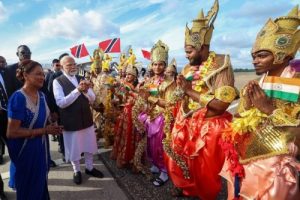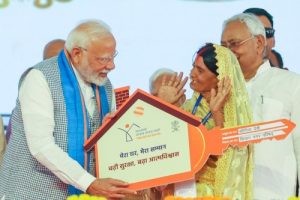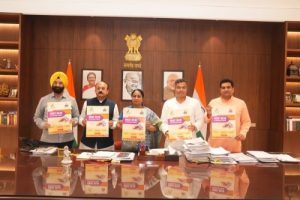
The latest literature on, “Politics for a New India: A Nationalistic Perspective”, Edited by Prof. Shri Prakash Singh. This variety of literature offers a modest attempt to seek an identity for “Bharatiya Ways of Study” and move away from the ‘Western Domination’ in Social Science. This literature aims at setting an alternative discourse in Political Science as against hegemonic discourse to diversify the outlook amenable to the historical and cultural context of India. Many Experts believes that this book may be treated, but with precaution, as Indigenization of Political Science in India.
Meanwhile, Prof. Shri Prakash Singh (Faculty of Social Science, University of Delhi), in the introduction part of book, “Deconstructing the dominant narratives in Indian Politics”, completely reject the system of ‘Euro-supremacist control’, ‘expose the dependence’ and ‘unrelenting academic imperialism’. It cautions against blind imitation without carefully testing against empirical realities of India to save the social sciences in General and Political Science in particular, from possible bias. Notably, “The book respects the existing discourse while putting the arguments against it”..
Moreover, Prof Singh, “The mainstream discourses of social sciences are “Eurocentric” and are an essential reflection of how they reflected and rainforced the imperialist project. That endures even after former colonies gain Independence”. Further, “The subtle and extremely damaging cultural domination of the ‘Core’ has found a grater expression in the work of Ngũgĩ wa Thiong’o, Decolonising the Mind: The Politics of language in African Literature, whose influential interpretation holds that postcolonial societies continue to rely without hesitation on the apparatus of imperialist perpetuation”.
Further he writes that, “After Independence, India has not experienced much success in this direction since studies in particular were neither culture-specific nor driven by its historical experiences. Getting exposed to what is called by a Malaysian scholar S.H. Alatas, a ‘Captive mind’, social science in India ended up ‘imitating uncritically’ the west in its methodology, conceptual designing, abstruction, theoretical underpinning and analysis”, Source, “Deconstructing the dominant narratives in Indian Politics”, Shri Prakash Singh, ‘Politics for a New India: A Nationalistic Perspective’.
Highlights: “Politics for a New India: A Nationalistic Perspective”
The First or opening chapter of this book deals with, “Revisiting Secularism, Nationalism and Intolerance: Interpreting through Dharma and Advita”, Author Aditya Gupta has attempted to prove that the notions, ideas, concept and theories of the west have been falsely replicated in the Indian context at the cost of our own rich cultural heritage and Intellectual traditions. In the second chapter, ‘Mappings Global Experience of Secularism: An Indian Perspective’, Author Sandipani Dash has attempted to explain that notions and practices in the West have different meaning and applications which, replicated in the Indian Scene, would be totally erroneous and misleading..
The third chapter of literature deals with, “RSS Ideology and Practice: The Context of Social Harmony, Author Vandana Mishra, examines RSS Ideology and Praxis in the maintenance of Social Harmony, Vedanta Mishra emphasizes the cardinal view of the RSS that the link running across nationalism, patriotism, cohesiveness, togetherness and social sensivity is the individual, his character and moral value. The fourth chapter deals with, ‘Kerala Model of Development: A Myth of Exceptionalism and the Reality’, the author, Akshay Kumar Singh, has surveyed the firmly placed but ideologically biased claims of the success of the so called Kerala Model of development..
In the chapter number five, ‘Vande Mataram: Literary Excursion, Nationalist Consciousness and Political Implication s’, Highlights that ‘Vande Mataram’, as an art, acts as more than a call for the nationalist; rather, it also assists in mapping the nation. Author Prashant Barthwal writes that the use of triad linguistic humour in the song makes the composition unique and more distinct from other songs and patriotic stotras. The song had met with many critical queries regarding its intensive thought, even in the contemporary era, where this had led to a complete ignorance of the literary humour and creativity which nonetheless spells assassination for an artist’s art.
In the Sixth chapter, “Glorification of Terrorism: Challenges, Responses and Pathway”, Author Pranav Kumar and Namita Kumari, a new phenomenon of glorifying terrorism has taken a tangible shape in an attempt to broaden the constituency in common masses, thereby seeking legitimacy for its causes.
In the Seventh Chapter, “Integral Humanism: An Alternative Discourse on Inclusivity and Sustainability”, Author Digvijay Singh, It aims to provide a life of dignity to the very human being while balancing the needs of the Individual with those society and different countries. In the Eighth Chapter, “Gender Emancipation and Abhinavagupta’s Hindu Philosophy”, Author Sonali Chitalkar and Rahul Chimurkar, “It examine the status of women in a historical context”.
In the Ninth Chapter, “Feminist Jurisprudence in 21st century & Relevance of Vedas in Contemporary word”, Author Seema Singh, argue that,”Feminist Jurisprudence has been analysed according to the social and religious structure of Different religions”
Final or tenth chapter of book, “Uniform Civil Code: A Constitutional Exploration”, Author, Shantesh K. Singh and Shailjia Nand Mishra, Argue that, “It is a burning need for Indian Polity which is secular in nature as a Uniform Civil Code would provide clarity which arises out of simplicity.”
Following the major content of book, “The system of Eurosupremacist domination-as identified by Ward Churchill-depends for its own intellectual paradigm in its approved way of thinking, seeing, understanding, and being, to the ultimate exclusion of all others. This academic imperialism, in contrast with political imperialism, is subtle but incisive and high in its intensity and outreach”. Prof Shri Prakash Singh argue that, ‘In developing societies, ideological compartmentalization of the search of knowledge has also taken a pernicious from for two reasons: first, in the name of indigenizing social science by a set of scholarship embedding a particular type of ideology values-although borrowed from the West-has rendered the social sciences investigating murky; second, the other issue pertains to an epistemological problem’..
More Significantly, Politics for a New India relies on objectivity and the analysis of world views drawn from our own intellectual traditions, as well as the metaphysical, philosophical and ethical assumptions at the core of our political issues. It also takes into its inquiry all those problems which have not been adequately paid attention so far but are legitimately needed in current political discourse. These include the RSS ideology and practice; perspective of Dharma and Advaita; literary excursion; integral humanism; Hindu philosophy and women rights; Kerala model of development; uniform civil code, among others. Added by prof Shri Prakash Singh in the introduction part of book, “Deconstructing the dominant narratives in Indian Politics”.
With the Inputs of book and its introduction, “Deconstructing the dominant narratives in Indian Politics”, Shri Prakash Singh, ‘Politics for a New India: A Nationalistic Perspective’.
Congratulations to Prof. Shri Prakash, DU and all the related authors.
Trilok Singh, Masters in Political Science, Kirori Mal College, University of Delhi.
BUY NOW























